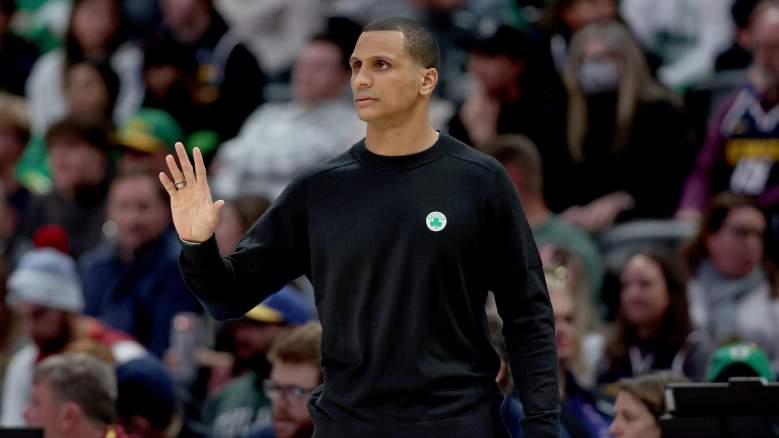
Getty Joe Mazzulla, Celtics
Joe Mazzulla’s aversion to calling timeouts has been a running theme to the Celtics season. While many other NBA coaches are quick to call for a break in the action to settle their troops when an opponent is making a run, Mazzulla lets the song play on.
Reporters question him about those situations after games, while some former players turned commentators will crack wise and wonder if he gets a reward for any timeouts left in his pocket at the end of the night. People wonder whether the first-year coach is freezing up when the game gets hot.
But there is a method to Mazzulla’s madness.
And it’s not even madness at all.
If you look at what basically got the Celtics eliminated from the playoffs in 2018, 2019, 2020 and 2022, it was veering from the collective plan when under pressure — devolving into quick shots and general individualism. As noted here in the past, the reflex is born more of players wanting to step up and take responsibility rather than of arrogance or selfishness. But such stuff essentially takes the Celts out of their game and usually makes things even worse.
So Mazzulla has spoken all season about the importance of building habits, of fighting through adversity by making the simple plays. The idea is that players should do the right thing by instinct.
“I’m sure he’s telling them that every day,” one opposing assistant coach told Heavy Sports. “In fact, I know he is. He shouldn’t always have to call a timeout to tell them again.”
Malcolm Brogdon: Mazzulla Preparing Cs for Adversity
The players understand Mazzulla’s TO reticence. At least they should.
“He’s talked to us about it,” guard Malcolm Brogdon told Heavy Sports. “I think in the media he’s gotten a little bit of blame for not calling timeouts when they say he should have. What we realize is he’s preparing us to play through adversity, especially when the playoffs come. So all this is meant to be a process for us.
“It’s not like he’s panicking; it’s not like he doesn’t know what to do. He wants us to learn how to play through those moments, because we’re going to have to do that in the playoffs to stop the other team from making runs, to make runs for ourselves and to win a championship. So it’s us maturing. He’s trying to teach us how to mature.”
And not look over your shoulder in times of adversity …
“Absolutely,” said Brogdon. “And play confidently.”
‘Let Them Figure It Out’
The late Frank Hamblen, a longtime respected NBA coach told of sitting on the bench with Phil Jackson when the Lakers would encounter trouble.
“Should we call a timeout?” Hamblen would ask.
“They got themselves into this,” Jackson would invariably reply, “let them figure out how to get themselves out of it.”
Brogdon nodded at the story’s retelling.
“That’s the mentality,” he said.
Again, the question becomes how you react when a situation gets difficult. Do you stick with the plan or, as the Celtics have done much to their doom in the past, revert to hero ball.
“Right,” Brogdon said. “And that’s how you learn what type of team you are. When you get into those ruts, can you get yourself out? Can you play the right way to get yourself out and figure out your identity again?”
The point is also made in specific situations, as with the final possession in last week’s loss at Miami. Jayson Tatum burned most of the remaining clock dribbling up top before his late pass was intercepted. Mazzulla skipped the timeout because he didn’t want the Heat subbing in a better defensive lineup, but he could have called one when he saw Tatum being stagnant to start.
The Celtics may have won or may have lost anyway. But Tatum said afterward he understood what he should have done with the ball, and if it serves the Celts in the future, one January loss will have been a relatively small price to pay.
Said Brogdon, “Being able to have that trust in the players is huge for us.”